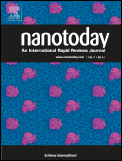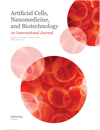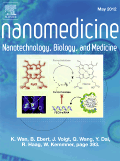
Cancer Nanotechnology
Scope & Guideline
Pioneering New Frontiers in Cancer Treatment with Nanotechnology
Introduction
Aims and Scopes
- Nanoparticle Design and Synthesis:
Research on the development of novel nanoparticles, including their synthesis and functionalization, to enhance drug delivery and therapeutic efficacy in cancer treatment. - Targeted Drug Delivery Systems:
Studies focusing on the use of nanoparticles for targeted delivery of chemotherapeutic agents, aiming to minimize side effects while maximizing treatment efficacy. - Theranostics:
Integration of therapeutic and diagnostic capabilities in nanoparticles to create theranostic agents that can monitor treatment response and improve personalized medicine. - Mechanistic Studies:
Investigations into the cellular and molecular mechanisms of action of nanoparticles in cancer therapy, including their interactions with cancer cells and the tumor microenvironment. - Biocompatibility and Toxicity Assessment:
Research evaluating the biocompatibility and potential toxicity of nanomaterials to ensure their safety in clinical applications. - Emerging Nanotechnologies:
Exploration of cutting-edge technologies, such as bioengineered nanoparticles and smart delivery systems, that represent the forefront of cancer nanotechnology.
Trending and Emerging
- Combination Therapies:
An increasing number of studies are exploring combination therapies that incorporate nanoparticles with other treatment modalities, such as chemotherapy, immunotherapy, and radiation therapy, to enhance overall treatment efficacy. - Smart Nanocarriers:
Research on intelligent nanocarriers that respond to specific stimuli (e.g., pH, temperature, or light) for controlled drug release is gaining momentum, allowing for more precise and effective cancer treatment. - Extracellular Vesicles and Biomimetic Nanoparticles:
Emerging interest in using extracellular vesicles and biomimetic nanoparticles for drug delivery, leveraging their natural targeting abilities and biocompatibility to improve therapeutic outcomes. - Nanotechnology in Immunotherapy:
A notable trend in utilizing nanoparticles to enhance cancer immunotherapy, including the delivery of immune checkpoint inhibitors and other immunomodulatory agents, is becoming increasingly prevalent. - Nanoparticle-mediated Gene Therapy:
Growing research focus on the development of nanoparticle-based systems for the delivery of RNA and DNA therapeutics, such as siRNA and gene editing tools, to target cancer cells at the genetic level. - Regenerative Nanotechnology:
Investigation into the role of nanoparticles in promoting tissue regeneration and repair in the context of cancer therapy is emerging as a novel area of research.
Declining or Waning
- Conventional Chemotherapy Alone:
There is a noticeable decrease in studies focusing solely on conventional chemotherapy without the incorporation of novel nanotechnology approaches, indicating a shift towards combination therapies involving nanoparticles. - Single Modality Treatments:
Research centered on single modality treatments, such as traditional drug delivery methods without the use of nanocarriers, is becoming less common as the field increasingly favors multimodal strategies that combine various therapeutic approaches. - Basic Nanoparticle Characterization:
While fundamental studies on nanoparticle characterization were once prevalent, the focus has shifted towards applications and therapeutic outcomes, leading to fewer publications solely dedicated to characterization without a direct link to cancer therapy. - Non-targeted Nanoparticle Applications:
There is a declining emphasis on non-targeted applications of nanoparticles in cancer therapy, as more researchers pursue targeted delivery systems that enhance therapeutic efficacy and reduce off-target effects.
Similar Journals

Nano Today
Navigating the landscape of advanced nanotechnological research.Nano Today is a prestigious journal published by ELSEVIER SCI LTD that stands at the forefront of nanoscience and nanotechnology research. With an impact factor that underscores its significance, this journal has achieved remarkable rankings in several key categories as of 2023, including Q1 positions in Bioengineering, Biomedical Engineering, Biotechnology, Materials Science, and Pharmaceutical Science, making it an essential resource for scholars and professionals alike. ISSN 1748-0132 and E-ISSN 1878-044X, the journal serves as a vital platform for disseminating cutting-edge research findings and innovative applications in the field. Although open access options are not available, the journal's rich repository of peer-reviewed articles provides invaluable insights into the latest advancements in nanotechnologies. Based in the Netherlands, Nano Today not only connects a global network of researchers but also propels forward the conversation on the transformative potential of nanomaterials across multiple disciplines. With a commitment to advancing knowledge and fostering innovation, Nano Today is an indispensable tool for academics and practitioners dedicated to pushing the boundaries of scientific exploration.

DRUG DELIVERY
Exploring Cutting-Edge Solutions in MedicineDRUG DELIVERY is a premier academic journal published by TAYLOR & FRANCIS LTD, with a steadfast commitment to advancing research in the fields of medicine and pharmaceutical sciences. As an Open Access journal since 2017, it offers unparalleled accessibility to its high-quality content, making it an invaluable resource for researchers, professionals, and students alike. With an impressive 2023 impact factor, it ranks in the Q1 quartile for both Medicine (miscellaneous) and Pharmaceutical Science, evidencing its significant impact within the scientific community. The journal focuses on innovative drug delivery systems, therapeutics, and methodologies that enhance patient care and treatment options. Based in the United Kingdom, it has evolved since its inception in 1993 to create a richly diverse platform for scholarly dialogue and advancements in the pharmaceutical landscape. Researchers looking to stay at the forefront of drug delivery research will find DRUG DELIVERY an essential companion in their pursuits.

Biomaterials Research
Pioneering breakthroughs in materials for medicine.Biomaterials Research, published by the American Association for the Advancement of Science, is a prominent open access journal established in 2014, dedicated to advancing the field of biomaterials. Based in the United Kingdom, this journal has swiftly become an essential platform for researchers and practitioners, offering groundbreaking insights in biomaterials, biomedical engineering, ceramics and composites, and miscellaneous medical fields. With its impressive Q1 ranking across multiple relevant categories in 2023 and its strong Scopus rankings, including a remarkable 90th percentile in the medicine category, Biomaterials Research showcases high-quality, peer-reviewed research designed to address both practical and theoretical challenges in biomaterials science. As an open access journal, it promotes wider dissemination and accessibility of research findings, crucial for fostering innovation and collaboration within the scientific community. Researchers, professionals, and students alike are encouraged to contribute, read, and engage with the latest developments in this dynamic field.

JOURNAL OF DRUG TARGETING
Advancing precision in pharmaceutical sciences.JOURNAL OF DRUG TARGETING, published by Taylor & Francis Ltd, is a premier academic journal dedicated to advancing the field of pharmaceutical sciences with a strong focus on drug delivery and targeting methodologies. With an impressive impact factor and recognized as a Q1 journal in the Pharmaceutical Science category, it ranks #23 out of 183 in Pharmacology, Toxicology and Pharmaceutics, placing it within the top 13% of journals in its field. The journal provides a platform for interdisciplinary research, showcasing innovative techniques and breakthrough findings that serve to improve therapeutic efficacy through precision targeting. Although it operates under a subscription model, researchers benefit from extensive access to pivotal studies spanning from 1986 to 2024. The JOURNAL OF DRUG TARGETING aims to foster collaboration among academics, professionals, and students, making it an essential resource for those seeking to leverage the latest advancements in drug development and delivery systems for improved healthcare outcomes.

Artificial Cells Nanomedicine and Biotechnology
Innovating Nanomedicine for Tomorrow's Therapeutic Breakthroughs.Artificial Cells Nanomedicine and Biotechnology is a prestigious peer-reviewed journal published by TAYLOR & FRANCIS LTD, specializing in the rapidly evolving fields of biomedical engineering, biotechnology, and nanomedicine. Established in 2013 and operating under an open-access model since 2019, the journal aims to bridge the gap between fundamental science and real-world medical applications, showcasing cutting-edge research that advances our understanding of artificial cells and their biotechnological applications. With an impressive impact factor and ranking in the Q2 quartile across various categories, including Biomedical Engineering, Medicine, and Pharmaceutical Sciences, the journal is a leading platform for innovative studies that contribute significantly to the realm of healthcare and therapeutic development. Researchers, professionals, and students alike will find invaluable insights and advancements within its pages, positioning it as a vital resource for those dedicated to pushing the boundaries of science and improving patient outcomes.

International Journal of Pharmaceutics-X
Transforming discoveries into solutions for global health.International Journal of Pharmaceutics-X is a premier open access journal published by Elsevier, dedicated to advancing knowledge and research in the field of pharmaceutical sciences. Launched in 2019, this journal has quickly ascended to the Q1 category in the 2023 Category Quartiles, reflecting its high impact and the quality of research it promotes. With a current Scopus ranking of #49 out of 183 in the Pharmacology, Toxicology and Pharmaceutics category, this journal occupies the 73rd percentile, showcasing its significant influence within the scholarly community. Emphasizing innovative research and novel applications, the International Journal of Pharmaceutics-X offers a platform for researchers, professionals, and students to disseminate their findings, making crucial contributions to the global pharmaceutical landscape. The journal is based in the Netherlands, presenting a vibrant hub for scientific discourse and collaboration in a rapidly evolving field.

International Journal of Nanomedicine
Connecting science and medicine through nanomedicine insights.International Journal of Nanomedicine, published by DOVE MEDICAL PRESS LTD, is a leading open access journal dedicated to advancing the field of nanomedicine and its applications in healthcare. Since its establishment in 2006, the journal has grown significantly, now encompassing a wide array of topics including bioengineering, biomaterials, biophysics, drug discovery, and pharmaceutical sciences, and is recognized in Q1 quartiles across major categories like *Nanoscience and Nanotechnology* and *Organic Chemistry*. The journal boasts an impressive standing within the Scopus rankings, with high percentiles across various related fields, making it an invaluable resource for researchers, professionals, and students seeking to stay informed on the latest innovations and developments in nanomedicine. With its commitment to fostering an accessible and collaborative academic environment, the International Journal of Nanomedicine serves as a vital platform for disseminating transformative research that impacts scientific practice and healthcare outcomes globally.

Current Cancer Therapy Reviews
Navigating the evolving landscape of oncology.Current Cancer Therapy Reviews, an esteemed journal published by Bentham Science Publishers Ltd, serves as a critical resource in the fields of cancer research, molecular medicine, and oncology. With an ISSN of 1573-3947 and an E-ISSN of 1875-6301, this journal provides a platform for the rapid dissemination of reviews that articulate the latest advancements and therapeutic strategies in cancer treatment. Although it currently holds a Q4 classification in its respective categories, the journal's commitment to quality scholarship is evident in its engagement with an expansive range of topics impacting cancer care. Operating from the United Arab Emirates since its inception in 2006, it is an essential tool for researchers, clinicians, and students aiming to stay abreast of the evolving landscape of cancer therapy. The journal emphasizes open access to knowledge, fostering a collaborative environment for innovative research. For those looking to deepen their understanding of contemporary cancer therapies, Current Cancer Therapy Reviews is a valuable addition to their academic resources.

Nano LIFE
Advancing the frontiers of nanotechnology in health and medicine.Nano LIFE, published by World Scientific Publishing Company, is a multidisciplinary journal that delves into the dynamic fields of bioengineering, biomedical engineering, and pharmaceutical science, providing a platform for researchers to disseminate their cutting-edge findings. With an ISSN of 1793-9844 and e-ISSN 1793-9852, this journal emphasizes the significance of nanoscale research in healthcare and technology, positioning itself as a vital resource for professionals and academics alike. Although currently categorized in the Q4 quartile for multiple scientific disciplines in 2023, its unique focus on the intersection of nanotechnology and life sciences aims to elevate the discourse in these rapidly evolving sectors. Researchers can anticipate publishing innovative methodologies and results, contributing to the overall understanding and application of nanotechnology in medicine. Located in Singapore, Nano LIFE not only serves the global research community but also reflects the growing interest in nanotechnology across diverse fields.

Nanomedicine-Nanotechnology Biology and Medicine
Unveiling the Power of Nanotechnology in Biomedical SolutionsNanomedicine-Nanotechnology Biology and Medicine is a leading journal published by Elsevier, dedicated to the exploration of innovative applications of nanotechnology in the fields of biology and medicine. With an ISSN of 1549-9634 and an E-ISSN of 1549-9642, this esteemed journal provides a platform for high-quality research, comprehensively covering areas including bioengineering, biomedical engineering, pharmaceutical science, and nanoscience. Notably, it holds a significant position in various categories with a Q2 ranking in multiple disciplines and a prestigious Q1 ranking in Pharmaceutical Science, emphasizing its impact within the scientific community. By facilitating access to cutting-edge studies and advancements, Nanomedicine-Nanotechnology Biology and Medicine serves as an essential resource for researchers, professionals, and students alike, contributing significantly to the ongoing development of nanomedicine and its pivotal role in improving healthcare outcomes. The journal operates without open access; however, it remains committed to disseminating valuable knowledge to a global audience.